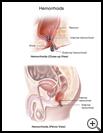
Hemorrhoid Surgery (Hemorrhoidectomy)
________________________________________________________________________
KEY POINTS
- Hemorrhoids are swollen veins in the lower rectum and anus. A hemorrhoidectomy is surgery to remove hemorrhoids if they are large, causing symptoms, and not responding to other treatments.
- Ask your healthcare provider which foods you should eat and avoid while you recover from surgery. Your provider may recommend a stool softener or laxative.
- Ask your healthcare provider how long it will take to recover, when you can return to your normal activities, and how to take care of yourself at home.
________________________________________________________________________
What is a hemorrhoidectomy?
A hemorrhoidectomy is surgery to remove hemorrhoids.
Hemorrhoids are swollen veins in the lower rectum and anus. The anus is the opening where bowel movements pass out of your body. The rectum is the end of the intestines just inside the anus. Hemorrhoids often cause pain, bleeding, and itching.
When is it used?
Your healthcare provider may recommend surgery if your hemorrhoids are large, causing symptoms, and not responding to other treatments. Removing the hemorrhoids should relieve your symptoms.
Ask your provider about your choices for treatment and the risks.
How do I prepare for this procedure?
- Make plans for your care and recovery after you have the procedure. Find someone to give you a ride home after the procedure. Allow for time to rest and try to find other people to help with your day-to-day tasks while you recover.
- Follow your provider's instructions about not smoking before and after the procedure. Smokers may have more breathing problems during surgical procedures and heal more slowly. It is best to quit 6 to 8 weeks before surgery.
- You may or may not need to take your regular medicines the day of the procedure. Tell your healthcare provider about all medicines and supplements that you take. Some products may increase your risk of side effects. Ask your healthcare provider if you need to avoid taking any medicine or supplements before the procedure.
- Tell your healthcare provider if you have any food, medicine, or other allergies such as latex.
- Your provider will tell you when to stop eating and drinking before the procedure. This helps to keep you from vomiting and possibly choking during the procedure.
- Follow any instructions your healthcare provider gives you.
- Ask any questions you have before the procedure. You should understand what your healthcare provider is going to do. You have the right to make decisions about your healthcare and to give permission for any tests or procedures.
What happens during the procedure?
The surgery may be done in a surgery center or hospital.
You will be given regional or general anesthesia to keep you from feeling pain. Regional anesthesia numbs part of your body while you stay awake. General anesthesia relaxes your muscles and you will be asleep.
Your healthcare provider will put a short, lighted tube called an anoscope into your rectum. Your provider will use the scope to see the hemorrhoids and make some cuts to remove them. Depending on how big the hemorrhoids are and where in the rectum they are, your provider may sew the cuts closed or leave them open to heal.
The procedure usually takes less than an hour.
What happens after the procedure?
After the procedure, you may stay in a recovery area for at least a few hours or overnight, depending on what was done during the procedure.
You may have some pain, nausea, vomiting, or constipation after the procedure. Your healthcare provider may give you medicine or recommend other ways to help these problems such as drinking lots of liquids.
Swelling around the surgery site may cause trouble passing urine and controlling gas and bowel movements for a few days after this operation.
Your healthcare provider may recommend the following to care for yourself as you recover:
- Take sitz baths by sitting in a bathtub of warm water for 15 to 20 minutes. This helps keep the area clean and increases blood flow to the area to help healing. Ask your provider how often you should do this.
- Ask your provider about ointments to put on the anal area.
- Use a “donut” pillow to help you sit more comfortably for the first few days after surgery.
It’s important to eat a healthy diet, but try to avoid foods that might cause constipation or diarrhea while you are healing. Ask your healthcare provider which foods you should eat and avoid while you recover. If diet and extra fluids are not enough to avoid constipation, your provider may recommend a stool softener or laxative.
Ask your healthcare provider:
- How long it will take to recover
- If there are activities you should avoid, including lifting, and when you can return to your normal activities
- How to take care of yourself at home
- What symptoms or problems you should watch for and what to do if you have them
Make sure you know when you should come back for a checkup. Keep all appointments for provider visits or tests.
What are the risks of this procedure?
Every procedure or treatment has risks. Some possible risks of this procedure include:
- You may have problems with anesthesia.
- You may have infection or bleeding.
- You may have trouble urinating.
- You may have scar tissue that makes the opening in the anus smaller. This can make it harder to pass bowel movements.
- Any hemorrhoids that were not removed may get irritated.
Ask your healthcare provider how these risks apply to you. Be sure to discuss any other questions or concerns that you may have.

